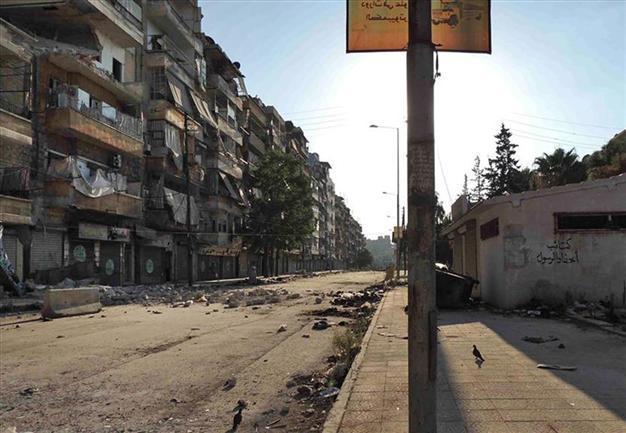Majority of Turks against Syria intervention: Survey
ISTANBUL

This citizen journalism image provided by Aleppo Media Center AMC which has been authenticated based on its contents and other AP reporting, shows damaged buildings due to heavy fighting between Free Syrian army fighters and government forces in Aleppo, Syria, Friday, Sept. 6, 2013. AP Photo/Aleppo Media Center, AMC
A majority of Turks disapprove of any potential military intervention in Syria, much like their European and American counterparts, a survey has revealed.In Turkey, 72 percent of respondents to the Transatlantic Trends 2013 survey, which was conducted by the German Marshall Fund of the United States (GMF), said their country should stay out of Syria, up 15 percentage points from last year, while only 21 percent – down 11 percentage points – favored intervention.
The respondents were told that there had recently been discussion about intervening in Syria, where the government has been using military force to suppress an opposition movement. They were then asked whether their government should stay out completely or intervene.
Apart from Turkey, 11 European Union member states were surveyed: France, Germany, Italy, the Netherlands, Poland, Portugal, Romania, Slovakia, Spain, Sweden, and the United Kingdom, as well as the United States. Polling was conducted between June 3 and June 27.
In the U.S., a two-thirds majority, 62 percent, up 7 percentage points from 2012, along with nearly three-fourths of respondents in Europe, 72 percent, up 13 percentage points from 2012, preferred to stay out.
Only one-in-three respondents in the United States, 30 percent, down 5 percentage points from 2012, and even fewer in Europe, 22 percent, down 10 percentage points from 2012, felt their countries ought to intervene in Syria.
In a separate question about recent developments in North Africa and the Middle East, respondents to the survey were asked to choose between two propositions: “stability is more important even if it means accepting non-democratic governments” and “democracy is more important even if it leads to a period of instability.” A majority in Europe, 58 percent, and a plurality in the United States, 47 percent, preferred democracy over stability.
A majority of Turkish respondents, 57 percent, preferred democracy in North Africa and the Middle East, 25 percent said they preferred stability, while 18 percent said they did not know or refused to answer.
















